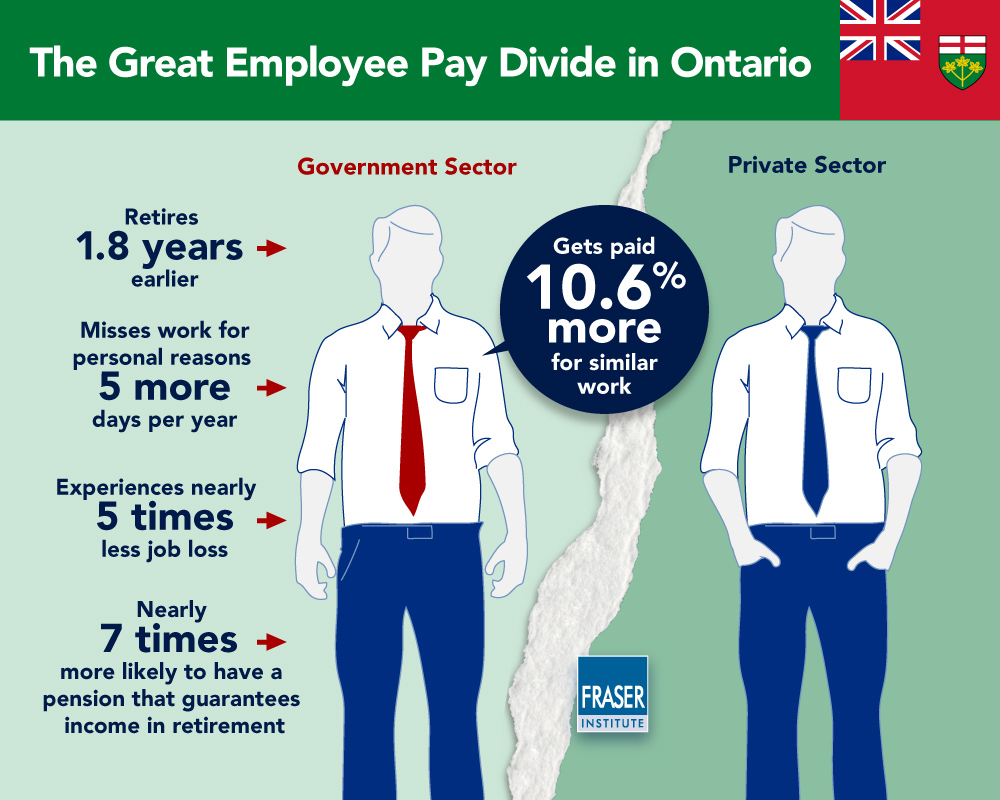Study
| EST. READ TIME 2 MIN.Government employees in Ontario paid 10.6 per cent higher wages than comparable private-sector workers
Comparing Government and Private Sector Compensation in Ontario, 2018
Main Conclusions
- Using data on individual workers from January to December 2017, this report estimates the wage differential between the government and private sectors in Ontario. It also evaluates four non-wage benefits for which data are available to quantify compensation differences between the two sectors.
- After controlling for factors like gender, age, marital status, education, tenure, size of firm, job performance, industry, occupation, and full- or part-time status, the authors found that Ontario’s government-sector workers (federal, provincial, and local) enjoyed a 10.6% wage premium, on average, over their private-sector counterparts in 2017. When unionization status is factored into the analysis, the wage premium for the government sector declines to 7.6%.
- The available data on non-wage benefits suggest that the government sector enjoys an advantage over the private sector. For example, 81.9% of government workers in Ontario are covered by a registered pension plan, compared to 25% of private-sector workers. Of those covered by a registered pension plan, 94.7% of government workers enjoyed a defined benefit pension compared to 41.5% of private-sector workers.
- In addition, government workers retire earlier than their private-sector counterparts— about 1.8 years on average—and are much less likely to lose their jobs (2.5% in the private sector compared to 0.5% in the public sector).
- Moreover, full-time workers in the government sector lost more work time in 2017 for personal reasons (12.4 days on average) than their private-sector counterparts (7.6 days).

Share
-

Milagros Palacios
Director, Addington Centre for Measurement, Fraser InstituteMilagros Palacios is the Director for the Addington Centre for Measurement at the Fraser Institute. She holds a B.S. in IndustrialEngineering from the Pontifical Catholic University of Peru and a M.Sc. in Economics from the University of Concepcion, Chile. Ms. Palacios has studied public policy involving taxation, government finances, investment, productivity, labour markets, and charitable giving, for nearly 10 years. Since joining the Institute, Ms. Palacios has authored or coauthored over 70 comprehensive research studies, 70 commentaries and four books. Her recent commentaries have appeared in major Canadian newspapers such as the National Post, Toronto Sun, Windsor Star, and Vancouver Sun.… Read more Read Less… -

David Jacques
David Jacques is an economist formerly with the Fraser Institute. He holds a B.Sc. in Environmental Sciences from the University ofGuelph and an M.Sc. in Food, Agricultural, and Resource Economics from the University of Guelph. He is currently working on studies of health and labour-market policy issues.… Read more Read Less… -

Charles Lammam
-

Steve Lafleur
Steve Lafleur is a research director at the Institute for Research on Public Policy, a former senior fellow of theFraser Institute and a former senior policy analyst at the Fraser Institute. He holds an M.A. in Political Science from Wilfrid Laurier University and a B.A. from Laurentian University where he studied Political Science and Economics. He was previously a Senior Policy Analyst with the Frontier Centre for Public Policy in Winnipeg and is a Contributing Editor to New Geography. His past work has focused primarily on housing, transportation, local government and inter-governmental fiscal relations. His current focus is on economic competitiveness of jurisdictions in the Prairie provinces. His writing has appeared in every major national and regional Canadian newspaper and his work has been cited by many sources including the Partnership for a New American Economy and the Reason Foundation.… Read more Read Less…
Related Topics
Related Articles
Santa Claus model of tax policy doesn’t work
By: Ben Eisen and Jake Fuss
Government job-growth rate in Canada vastly outstrips private sector
By: Ben Eisen and Milagros Palacios
Ford’s mini-budget keeps Wynne fiscal legacy intact
By: Ben Eisen and Jake Fuss
Wages and salaries lower in Alberta than every U.S. state
By: Tegan Hill and Alex Whalen